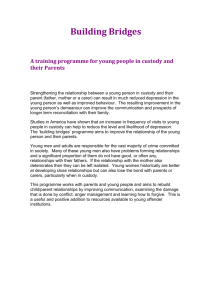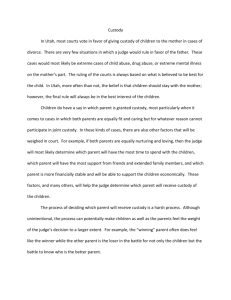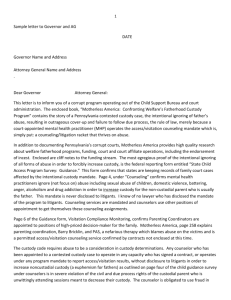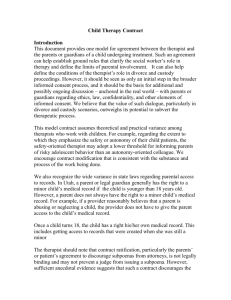Lesson Plan - University of Washington School of Law
advertisement
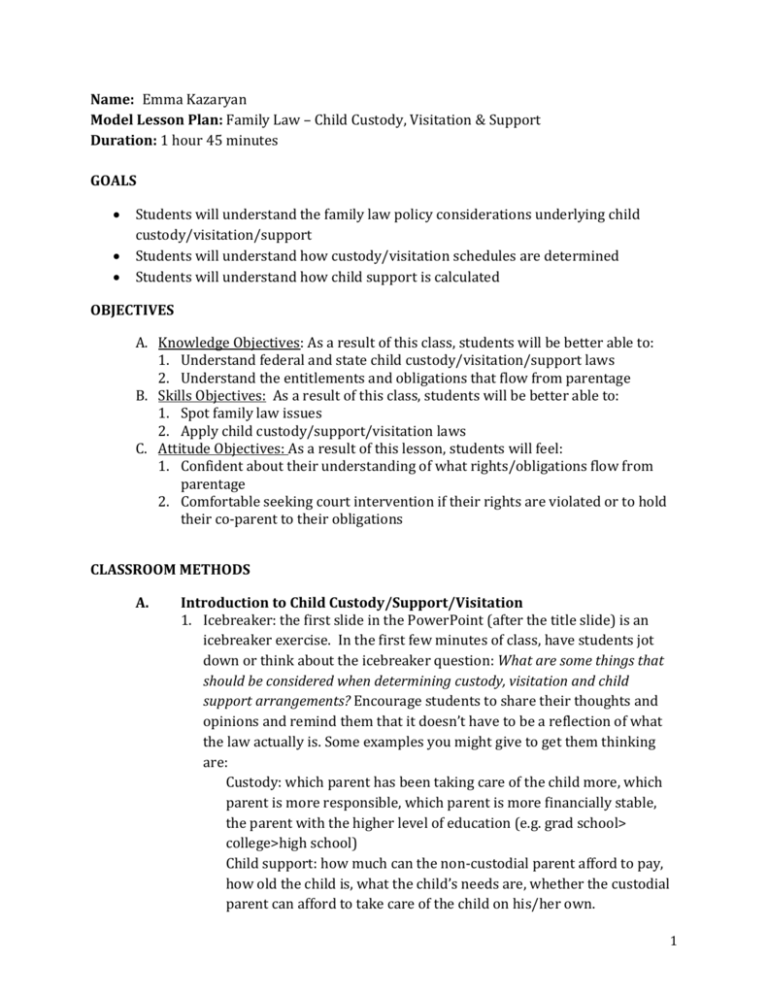
Name: Emma Kazaryan Model Lesson Plan: Family Law – Child Custody, Visitation & Support Duration: 1 hour 45 minutes GOALS Students will understand the family law policy considerations underlying child custody/visitation/support Students will understand how custody/visitation schedules are determined Students will understand how child support is calculated OBJECTIVES A. Knowledge Objectives: As a result of this class, students will be better able to: 1. Understand federal and state child custody/visitation/support laws 2. Understand the entitlements and obligations that flow from parentage B. Skills Objectives: As a result of this class, students will be better able to: 1. Spot family law issues 2. Apply child custody/support/visitation laws C. Attitude Objectives: As a result of this lesson, students will feel: 1. Confident about their understanding of what rights/obligations flow from parentage 2. Comfortable seeking court intervention if their rights are violated or to hold their co-parent to their obligations CLASSROOM METHODS A. Introduction to Child Custody/Support/Visitation 1. Icebreaker: the first slide in the PowerPoint (after the title slide) is an icebreaker exercise. In the first few minutes of class, have students jot down or think about the icebreaker question: What are some things that should be considered when determining custody, visitation and child support arrangements? Encourage students to share their thoughts and opinions and remind them that it doesn’t have to be a reflection of what the law actually is. Some examples you might give to get them thinking are: Custody: which parent has been taking care of the child more, which parent is more responsible, which parent is more financially stable, the parent with the higher level of education (e.g. grad school> college>high school) Child support: how much can the non-custodial parent afford to pay, how old the child is, what the child’s needs are, whether the custodial parent can afford to take care of the child on his/her own. 1 After students have had a few minutes to write down their thoughts, ask for volunteers to share their ideas and explain why they think something is important to consider. 2. Go through Pt. I of the PowerPoint covering the following material; the notes below correspond with each slide in the PowerPoint. Note: the information in this PowerPoint is from: Family Law Examples and Explanations - 3rd Edition by Robert Oliphant and Nancy Ver Steegh - Aspen Publishers. i. Overview of child custody Defining Custodial Relationships: Some legislatures, as well as the American Legal Institute (ALI), have created presumptions that joint legal custody and joint physical custody are in the best interests of the child. How Is Custody Determined?: Courts are interested in the “best interests of the child.” To determine what constitutes the best interests of the child, courts consider a variety of factors including, but not limited to, the ones listed here. Child’s preferences: child must be of a certain age/maturity to express preference. A child’s preference is not dispositive. Courts will also sometimes consider why a child is expressing the preference. For example, if a teenager expresses a preference to live with his father because the father is less strict, doesn’t set a curfew and lets him skip school all the time, the court might not be willing to give credit to the teen’s preference. Child’s adjustment to school/home/community: if granting custody to one parent over the other results in less disruption to the child’s home/school/community, this goes toward showing the best interests of the child. This goes hand-in-hand with maintaining the status quo. Status quo: Maintaining the status quo refers to keeping things as they have been. Courts really value not disrupting the child or causing too much change in the life the child is accustomed to. For example, if the parents have been separated for four years prior to filing for divorce and during that time, their six-year-old child has lived primarily with her father, the courts would be hesitant to disrupt or change the arrangement. Health of individuals involved: It’s important to note that this does not give courts the freedom to discriminate against individuals with disabilities. A parent’s illness or disability cannot be the only factor in determining the best interests of the child. It’s OK for courts to consider health in a more holistic way. Natural parent presumption: Typically, natural (biological) parents have a right to their children over al third parties. This includes step-parents, grandparents, etc. How Custody is NOT Determined: Paternal/maternal presumption: Courts used to rely on stereotypes about sex to determine custody. For example, the maternal presumption was that mothers are naturally more loving, caring and fit to raise children so mothers would historically be automatically granted custody. Similarly, 2 before that, a paternal presumption existed that fathers were better financially able to care for their children so they would always get custody. Courts have abandoned sex-based presumptions for purposes of considering custody; they are now more concerned with the best interests of the child rather than the sex of the parent. Some jurisdictions have held these presumptions to be unconstitutional. Cohabitation: Cohabitation refers to two or more people living together. The UMDA (Uniform Marriage and Divorce Act) and ALI (American Legal Institute) prohibit the consideration of cohabitation for purposes of determining custody UNLESS it affects the child. So, for example, if a mother lives with her boyfriend, this does not preclude her (or count against her) from having custody of her child unless it affects the child (e.g. the boyfriend abuses the child). Careers: The ALI prohibits consideration of relative earning capacity of the parents (Section 2.12(1)(f)) Gay and Lesbian Parents: The ALI specifically prohibits courts from considering the sexual orientation of the parent. (Section 2.12(1)(d)) Parental conduct not affecting the child: Many states have adopted statutory language contained in Section 402 of the UMDA preventing courts from considering parental conduct that does not affect the parent’s relationship to the child. Usually there must be a nexus between the parental activity and harm to the child. Whether parental conduct affects the child is a question of fact that the trial court must determine on a caseby-case basis. Child Custody Modification: Once custody is assigned, it is difficult to modify it. Note again the preference for maintaining stability and the status quo for the child. A substantial change in circumstances means a fact or issue that did not exist at the time that the original custody order was entered. A fact that existed at the time the original custody order was entered cannot later be used as a reason to modify. Relocation: If a parent has sole custody of a child, he or she may generally relocate to another state with that child (remember, people have a constitutional right to travel between the states). Visitation with the other parent must be honored and travel expenses incurred to make the visitation possible may be used to offset the non-custodial parent’s child support obligations. If the parents have joint custody, the parent seeking to relocate must file a petition showing that the move would be in the best interests of the child. This is essentially a custody modification action because the relocating parent is essentially seeking to have his or her custodial status heightened to sole custody with visitation for the other parent. ii. Overview of visitation Visitation: The final custody order usually schedules hours for parenting time (visitation) and address issues such as transportation, holidays and vacations. Note that stepparents, grandparents, and other 3rd parties are generally NOT entitled to visitation. There was a case from WA called Troxel v. Granville where 3 the Supreme Ct struck down a WA state statute that granted visitation for grandparents. Standards for Denying or Limiting Visitation: Because parents have a constitutional right to have contact with their children, courts will ONLY deny visitation in the most egregious circumstances. The burden is on the parent contesting the visitation to show that the child will be seriously endangered. Note that even the permissible factors for consideration often result in limitations on visitation-such as supervised custodial time or exchange of child thru an intermediary- but not necessarily an outright denial of visitation. iii. Overview of child support What is Income for Purposes of Child Support?: Pretty much anything and everything counts as income for purposes of child support. Non-custodial parent pays child support to the custodial parent. Stepparents usually are not obligated to pay child support for their stepchildren upon divorce. Imputation of Income: Different jurisdictions do this differently. Some have a very strict approach where they will always impute income for voluntary under- or unemployment. Other jurisdictions follow a less strict approach where they only impute income if there is a bad faith effort to avoid child support obligations. In such jurisdictions, somebody who is making a good-faith effort to find a job or is underemployed for a ‘good’ reason (i.e., not simply to avoid their support obligations; examples include taking a salary cut to work for a nonprofit they are really passionate about or making a lifestyle change). Some jurisdictions take an intermediate approach and are somewhere in the middle. Calculating Child Support: Deviations can be made from child support obligations based on a child’s need for medical support or special care. A parent who owes child support CANNOT withhold payment just because the custodial parent withholds visitation; similarly, a custodial parent cannot withhold visitation just because child support is owed. Washington State is an income shares model state. Consequences of Failure to Pay Child Support: Child support was historically a state issue but in an effort to promote uniformity and reduce public assistance expenditures, the federal government became increasingly involved in creating national child support policy. The Child Support Recovery Act of 1992 made it a federal crime to willfully fail to pay a past-due support obligation. In 1998 CRSA became “Deadbeat Parents Punishment Act” B. Exercise: Small Group Discussions 1. Break the students into small groups of about 4-5 students each 4 2. Pt. II of the PowerPoint consists of a series scenarios; post the scenarios one by one. Give the students a few minutes to discuss the issues in the scenario and then reconvene as a class and have students share what they discussed in their groups. The issues in each scenario are: Scenario #1: There is definitely an issue here! As we discussed, maternal/paternal presumptions are inappropriate considerations for determining custody. Scenario #2: No, Kail cannot legally withhold visitation just because Joe is failing to fulfil his support obligations. There is alternative recourse for Kail, such as seeking court enforcement or some of the other penalties we discussed for failure to make child support payments. Scenario #3: Beyonce must pay Jay-Z $400K monthly. Beyonce owes $1.2 million and Jay-Z owes $800K. Since it doesn’t make sense for them to ‘exchange’ checks, Bey just pays Jay-Z the difference. Scenario #4: Probably not. If a parent has sole custody of a child, he or she may generally relocate to another state with that child (remember, people have a constitutional right to travel between the states). Scenario #5: Courts have recognized that it is in children’s best interests to have stability; thus, maintaining the status quo is usually favored. Thus, since the kids have been living primarily with Angelina, a court would likely be hesitant to disrupt this arrangement and grant sole custody of the kids for Brad. Courts have also recognized keeping siblings together often goes towards children’s best interests. Thus, Brad’s proposal of splitting the kids down the middle is misguided and unlikely to be adopted by a court. Scenario #6: Yes, Victoria can ask the court to impute David’s salary for purposes of calculating child support. Because David is voluntarily unemployed in a bad-faith effort to avoid his child support obligations, the court will probably not hesitate to impute his former income onto him. C. Exercise: Trivia Game Trivia questions and answers are in an attached document 1. Have each team take out a piece of paper and number It 1-10. 5 2. Tell the students that you will be reading out loud trivia questions; as you ask each question they should write their answer next to the corresponding number. Read each question aloud at least twice; you can repeat questions as necessary. 3. After you have gone through and read all of the questions and students have had an opportunity to fill in their answers, go through each of the questions as a class. For example, re-read the first question and have each of the teams say their answer. After all of the teams have said what their answers are, tell students what the correct answer is. Have the students ‘grade’ their own quizzes. 4. At the end of the game, the team with the most correct answers gets a small price EVALUATION A. Student participation in small group discussions of scenarios B. Student participation in trivia game 6 Child Custody/Visitation/Support Trivia Questions & Answers 1. True or false – legal custody refers to a parent’s authority to make major decisions on behalf of the child. (TRUE) 2. When determining custody, courts are most interested in _____________________ . (Best Interests of the Child) 3. Name two appropriate considerations for determining the best interests of the child. (Some acceptable responses: keeping biological siblings together, parents preferences, child’s preferences, status quo, natural parent presumption, child’s adjustment to school/home/community, health of the individuals involved) 4. Name two inappropriate considerations for determining the best interests of the child. (Some acceptable responses: paternal/maternal presumption, cohabitation, careers, gay and lesbian parents, parental conduct not affecting child) 5. True or false – once courts enter into a custody agreement, they are usually hesitant to change it unless there is a substantial change in circumstances (True) 6. True or false – a parent with sole physical custody can generally move out of state with the child if he or she wishes to do so. (TRUE) 7. True or false - Grandparents and stepparents are entitled to visitation. (FALSE; see Troxel v. Granville). 8. True or false – a parent who is unemployed is exempt from child support obligations (FALSE; courts may impute income) 9. True or false – willful failure to pay child support is a federal crime (True) 10. Parents are generally entitled to visitation unless the court finds, after a hearing, that _____________________________ (visitation would endanger seriously the child’s physical, mental, moral or emotional health)
